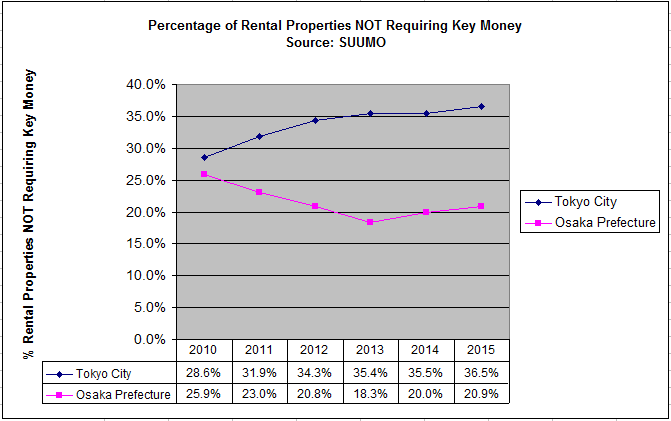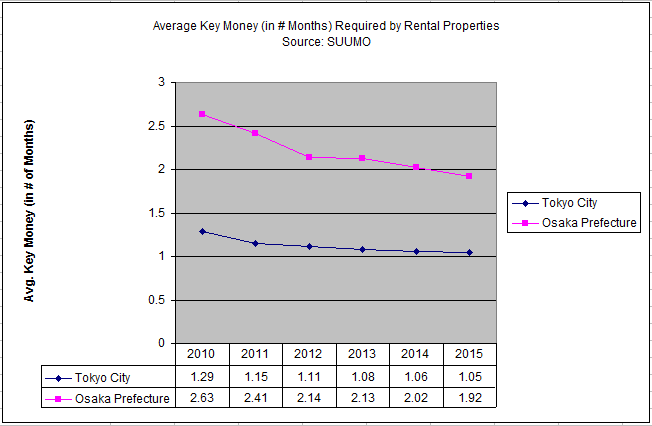When you’re looking for an apartment in Japan, you’re often told that deposits and key money are a fact of life. Another canard is that key money is usually much higher in Osaka than in Tokyo. Other people will tell you that there are apartments available where you don’t have to pay any deposit or key money at all.
What is the truth behind these statements?
“You always have to pay a deposit AND key money when you rent an apartment in Japan.”
False. Most rental properties do require that you pay both a deposit and key money, but there is a growing percentage of properties that require neither. According to data compiled by SUMMO, in 2015, about 11.2% of rental properties in Tokyo and 16.7% of rental properties Osaka did not require either. As the chart shows, this also seems to be a growing trend in the last few years.
“You always have to pay a deposit when you rent an apartment in Japan.”
False. The following chart shows the percentage of apartments that do not charge a deposit (but may charge key money!).
In Tokyo, there is a growing trend in properties that do not require a deposit. According to SUUMO, in 2015, about 17.6% of rental properties in Tokyo do not require an upfront deposit (versus 8.1% in 2010).
The percentage of rental properties that do not require a deposit is much higher in Osaka (65.5% in 2015). Does this mean that landlords in Osaka are more confident that their tenants will not do damage to their properties? Not really.
In Osaka, some rental leases also require hoshoukin (保証金) in addition to shikikin (敷金).Hoshoukin and shikikin are often both translated as “security deposit” in English, but in Osaka, there are some rental properties that require that you pay both hoshoukin and shikikin, as separate line items.
In cases where the tenant only pays a deposit designated as shikikin (and no hoshoukin), when the apartment is vacated, the landlord is supposed to deduct a cleaning fee from the deposit and return the balance to you. This is the usual practice in Tokyo. In practice, hoshoukin in addition to shikikin, is not common in Tokyo.
In Osaka, however, in cases where the tenant pays hoshoukin in addition to shikikin, the landlord deducts the shikikin and the cleaning fee from the hoshoukin, then returns the balance to you. In practice, houshoukin functions a lot like a second deposit.
What about key money?
“Key money is a cultural custom that you can’t avoid.”
False. The following chart shows that there is a growing percentage of apartments in Tokyo that do not charge any key money. In Osaka, however, there is a slight trend towards more apartments charging key money.
In Tokyo in 2015, 36.5% of rental properties did not require key money. In Osaka, this number was lower, at 20.9%.
“Key money is usually higher in Osaka than Tokyo.”
True. According to data compiled by SUUMO, the average amount of key money (as a multiple of the monthly rent) is higher in Osaka than Tokyo, but as the following chart shows, this multiple is on a downward trend in both cities.
There is also a downward trend in average deposit (as a multiple of the monthly rent) in both Tokyo and Osaka.
Looking at these downward trends, another takeaway is that tenants are actually paying less in combined deposit and key money now (2015) than they were five years ago.
In Tokyo, in 2010, the average deposit and key money charged for a typical residential lease totalled about 2.76 months of rent. This decreased to an average of 2.19 months in 2015.
In Osaka, in 2010, the average deposit and key money charged for a typical residential lease totalled about 4.03 months of rent. This decreased to an average of 2.81 months in 2015.
You may also be interested in this article: Upfront cost of renting an apartment in Japan,
Source: SUUMO
Tokyo Apartments
Browse our comprehensive listings and find your ideal apartment in Tokyo and Japan!




8 thoughts on "Facts about deposits and key money in Japan"
While deposits perform a viable economic function within the contractual obligations of tenants and landlords, key money – on the other hand – exists today solely as a financial scam. Many people are fully aware of where the practice of key money began, how it started, and the social purpose it functioned to fulfill so long ago… however, those socially functioning obligations have long, long been past away. Reikin is essentially nothing more than a “gift”, to which is NOT paid
back, therefore it’s true worth amounts to nothing more than a bribe… In the past, it was a socially accepted – though acceptedly underhanded – way of getting the land lord to choose you as the tenant by giving them the biggest “gift” of “thanks”… it was a bribe, nothing more. Yet today, if I’m paying you a deposit, that money covers any number of legal responsibilities – to include future repairs, maintenance upkeep, and eve damage costs – then there is zero reasons to bribe anyone. Your “gift” is therefore the continued propagation of your business (renting), which you receive via rent money. By paying a deposit, I’m further providing you with the funds in advance for any potential issues that may arise while I occupy the premises… In other words… Key Money is a scam…
Today, and even within the previous several decades, the justification for the existence of key money no longer exists… instead, the acceptance of key money as a fact of life persisted only because 1: land lords and agencies continued to demand it, and 2: because people unwilling to break with custom simply allowed themselves to be taken advantage of and paid up. By paying up, those mass numbers of individual cases furthered the continued justification and practice of demanding key money, which at this point in age, is nothing more than a beyond generous tip or charitable donation for service performed to which were already going to be paid for by several other means. Key money, and the entire idea of key money today, is nothing more than a financial scam. It serves zero purpose other than to unjustifiably line pockets, and if the masses would have simply realized this long ago, and refused to take part in paying up, the practice would have died out long ago as well.
There is no “scam” in key money. If you don’t like it you can try negotiating it down or finding a property that does not require it. What you fail to understand is that apartments belong to private owners who make financial conditions as they desire. More often than not, however landlords will charge key money to cover the costs of vacancy and agency fees.
To be honest there is more scam associated with usage of security deposit as landlords try to squeeze every yen out of their tenants. I threatened to go to court and only then I got most of it back. For example they specify how items depreciate over time (the more you stay they less you will have to pay in repairs), but then exclude wooden flooring from the depreciation scheme, meaning that if landlord thinks that there are scratches on floor, they will try to charge for full renewal. I stated that flooring was never repaired in 20 years of the apartment existence and asked if they expect it to stay brand new for so long. They came back with a ‘no’ and backed off.
More often than not, landlords will try to use your security deposits to do renovations, so beware.
Another useless fee is agency fee. They charge full month even in the event when I find the apartment myself and ask them to arrange it for me. I do half the job, so why are they getting full compensation on it?
While I agree completely with your point on the purely evil intentions of those land lords who try to extort the use of a tenants security deposit after leaving – in which they do so purely for personal gain – I completely stand by my assessment of Key Money as a complete scam. In today’s day in age, there is zero justification for the existence of key money. It’s a bribe, nothing more. If I’m paying a security deposit and rent, there is zero reason for a land lord to demand me pay them extra money on top of that as a “thank you” for allowing me to rent. That “thank you” is fully able to be expressed in kind words of thanks, and by me being a good tenant who treats the rented domicile with respect while I’m there. Key Money is a beyond outdated practice that only exists today because people on a large scale have yet to refuse to pay it. In sociological terms, it exists still today because people that agree to pay it further justify its continued existence. To the land lord, it’s like “Hey, they’re willing to give me a free bonus payment for no reason? Why SHOULDN’T I keep doing it?!” And in THAT respect, that way of thinking is not only what keeps it around, it is ALSO just as evil as your point about land lords who try to scam leaving renters security deposits for personal gain as well. Further, I also completely agree with you on the practice of agencies attempting to charge a full month despite only doing half (or often less) the work. If I’m going out and finding my own place, and that place just happens to be listed through an agency, and the land lord refuses to allow me to rent without going through said agency, and when I do, the only thing the agency does is the paperwork, then there is zero justification for charging me the full price of the agency going out and finding me the apartment I already found. At MOST the ONLY thing they should legally be allowed to charge is a SMALL administration fee for doing a little bit of paperwork. Trying to charge me full price for a set of services I never used is a scam as well. But again, like many things in Japan, these things still happen purely for sociological reasons. They exist because the people committing these low-life types of scams receive justification for continuing the practice every time they get away with it, every time a person actually pays up. You find the exact same crap with shaken vehicle inspections when you are ONLY there for a simple inspection, and when you get the bill, suddenly you discover you’ve been charged for all kinds of crap you NEVER asked for – like new windshield wipers, an oil change (which often doesn’t even come close to qualifying as a full oil change), interior cleaning, and other garbage. They hope that you – just like EVERYONE ELSE – will simply smile, say thank you, and pay up. If you do, congratulations, you just continued the further justification of that type of scam.
There are many countries that under stand the ethics of property rental and key money is outlawed. But here in Japan bad practices always occur.
Considering that Japan is the only country in the world that officially and legally accept known criminal syndicates to be registered as official businesses and for those to have access to all the public services any legal business can have access is already a sign that Japan has always been made within the margin of corruption.
Basically, in Japan, all important decisions are taken with sake in one hand and a bride in the other. (That’s a figure of speech, but it’s ironically close to the truth.)